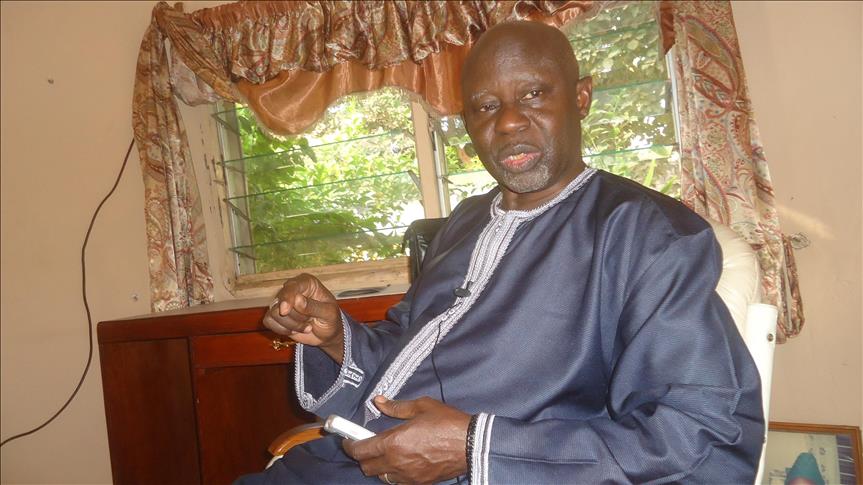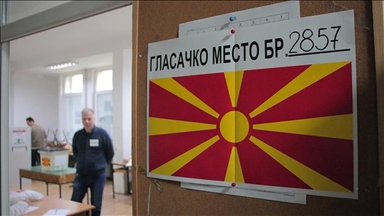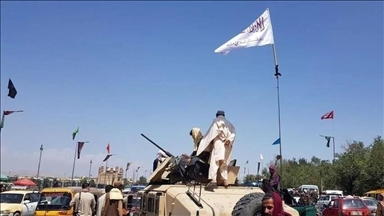Gambian opposition demand electoral reforms
Opponents of President Yahya Jammeh say changes to electoral law have hamstrung free and fair contest
 Lawyer Ousainou Darboe, the leader of the country’s biggest opposition group, the United Democratic Party
Lawyer Ousainou Darboe, the leader of the country’s biggest opposition group, the United Democratic Party
Banjul
By Mustapha K Darboe
BANJUL, Gambia
The battle lines for the presidential race in Gambia have been drawn, but the opposition and the country’s electoral authorities are in dispute over the rules of engagement.
The people of the small West African country will head to the polls to elect their president on Dec. 1 this year but opposition leaders argue that the political landscape is not a level playing field for the conduct of free and fair elections.
Lawyer Ousainou Darboe, the leader of the country’s biggest opposition group, the United Democratic Party, said the integrity of the polls will be questioned if elections are held under the current circumstances.
“If our electoral and constitutional reforms proposal was accepted, we would have moved one step towards protecting the integrity of polls in the country,” Darboe, President Yahya Jammeh’s toughest opponent since 1994, told Anadolu Agency.
“The [Independent Electoral Commission] IEC did not only reject our reform proposal but it introduced a change to the electoral law that made the situation even more horrible than it was,” he added.
In May last year, the Gambian opposition put together constitutional and electoral reform proposals which included a term limit for the presidency, fresh demarcation of electoral constituencies and involvement of civil society institutions in the selection of commissioners of the electoral body.
They also demand changes from the current voting system to ballot papers, non-involvement of civil servants in the electoral process, reinstatement of second-round voting and the enfranchisement of Gambians overseas.
Opposition leaders said the country’s electoral body has completely neglected those demands and instituted what Omar Jallow, leader of the opposition People’s Progressive Party, calls a “replica of apartheid”.
The IEC in early July 2015 brought its own electoral law reform to the National Assembly which required presidential candidates to pay a fee of $12,630 for registration, previously $252.
Jallow said in a country where 48% of the people live below a dollar a day, the new law only sought to introduce “another type of apartheid” where the “poor will be totally denied of any political participation”.
“They are now introducing another type of apartheid in The Gambia because we will have the minority rich taking all political decisions and suppressing the majority poor,” he told Anadolu Agency.
Jallow, a former minister in a former PPP government, added that the privilege that the country’s law gives the president to select the IEC chairman and commissioners has subjected the integrity of the polls to question.
“The IEC to me is an extension of the APRC party… A team that is given the privilege to choose a referee for a game it is playing with an opponent will certainly win on their chosen referee’s favor. If the law gives the president the power to select all the commissioners of the IEC and can sack them at will, who are they going to support? So I am angry with the members of parliament.”
However, Amadou Camara, a political analyst, believes the IEC electoral reform might not affect the integrity of the polls, saying it includes some positive changes to the country’s electoral law.
“The reform has some very positive aspects and bad ones as well. Among the bad effects is that it has opened our democracy to the control of the rich. But also the … amount charged to people who have lost or damage their voters’ card is unjustifiable because it will lead to decline in participation in the electoral process,” he said.
“However, the reform also calls for parties to hold congresses twice a year, institute on-the-spot counting of votes and as well moving the issuing of permits to hold political rallies from the police to the electoral body, IEC.”
The IEC electoral reform, which was signed by the president in July 20, last year, has also required opposition parties to submit their annual audited accounts to the electoral institution and open offices in every region of the country.
Hamat Bah, leader of the National Reconciliation Party, said it is unfair for the IEC to request opposition parties to submit to them their audited accounts when every penny they spend comes from their pockets.
The IEC reform also requires National Assembly candidates to pay a registration fee of $1,263, previously $126, before they can contest for the elective position.
But despite opposition’s criticisms of their electoral reform, the IEC remains positive that the current political landscape is best prepared to hold elections that are free and fair.
“Sequel to the recent amendment to the Elections Acts 2009 especially the amendments made to Section 105, all political parties are urged to regularize their status accordingly,” the IEC said in a statement, after the bill became law.
The opposition leaders in the country are in a meeting to determine what action they might take to make further push for reform, Darboe -- who chairs their meetings -- told Anadolu Agency.
“We have met to review the situation and at the appropriate time we will take decisions… We will continue to push for reforms,” he said.
However, Camara observed that the opposition will hardly get their way with their desired constitutional and electoral law reforms before elections:
“The elections are coming in December; their efforts are coming too little too late especially when you consider the fact that the National Assembly is also control by the APRC, almost 90%.”
Meanwhile, the IEC has already started voters’ registration for those who turned 18 or will reach that required constitutional age before elections are due in December.
Gambia is a small country with a population of 1.9 million people and is surrounded by Senegal on all three sides, with the Atlantic Ocean covering the remaining side.
The country’s president, Yahya Jammeh, came to power through a bloodless coup in 1994 and has won four elections.
During the 2011 presidential election, monitors from the Economic Community of West African States boycotted on grounds that it “won’t be free and fair”, a claim APRC and IEC both vehemently denied.
Anadolu Agency website contains only a portion of the news stories offered to subscribers in the AA News Broadcasting System (HAS), and in summarized form. Please contact us for subscription options.



